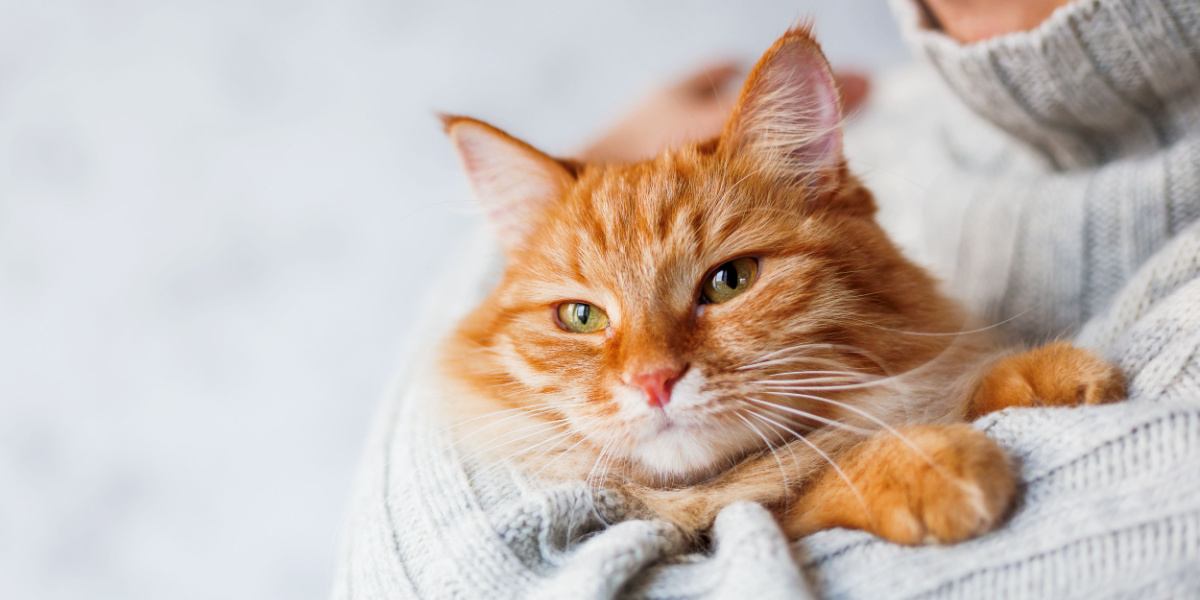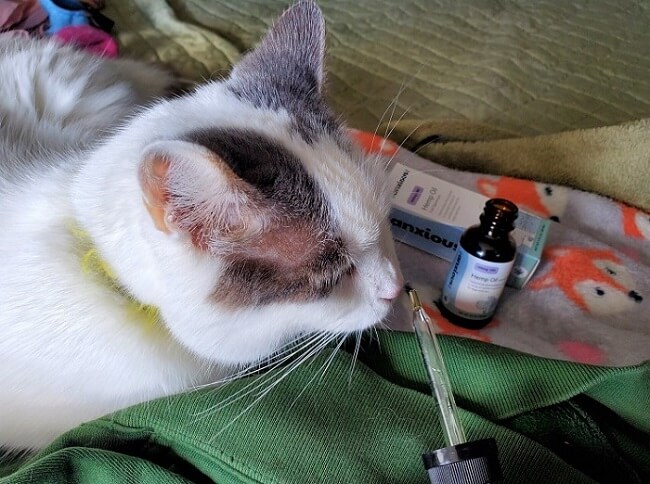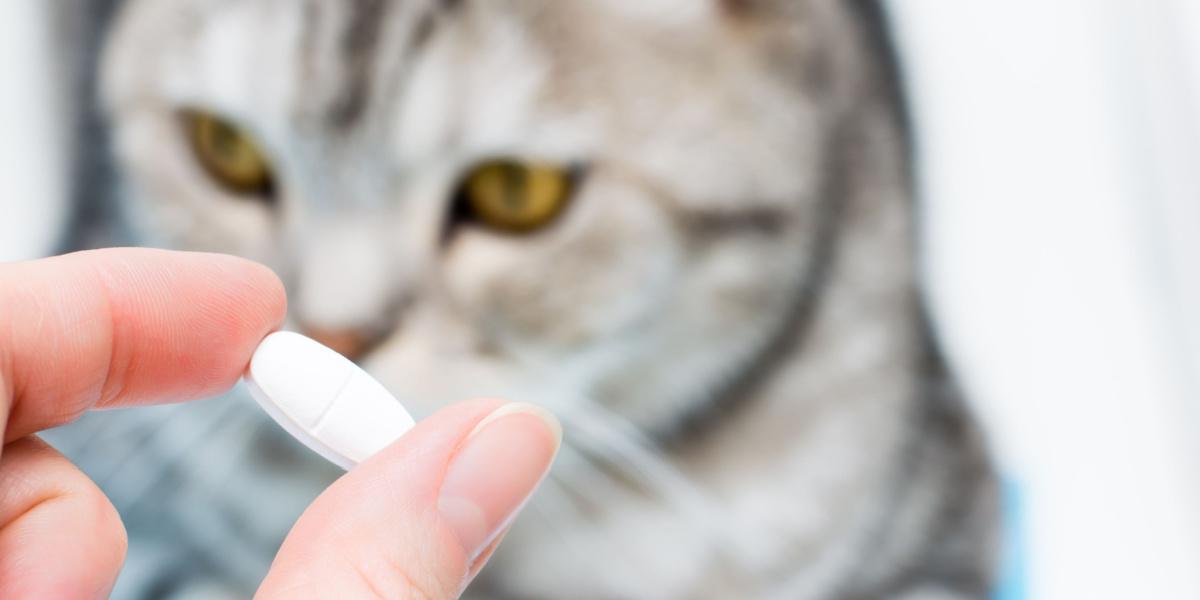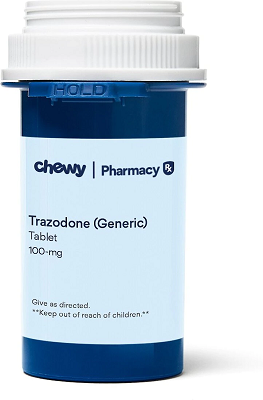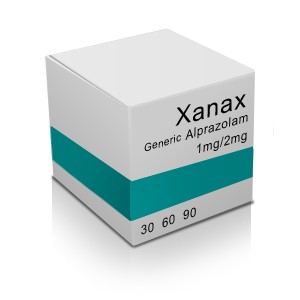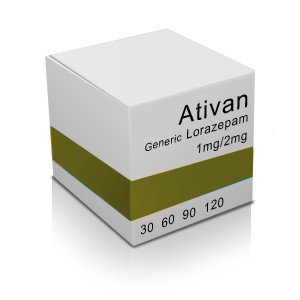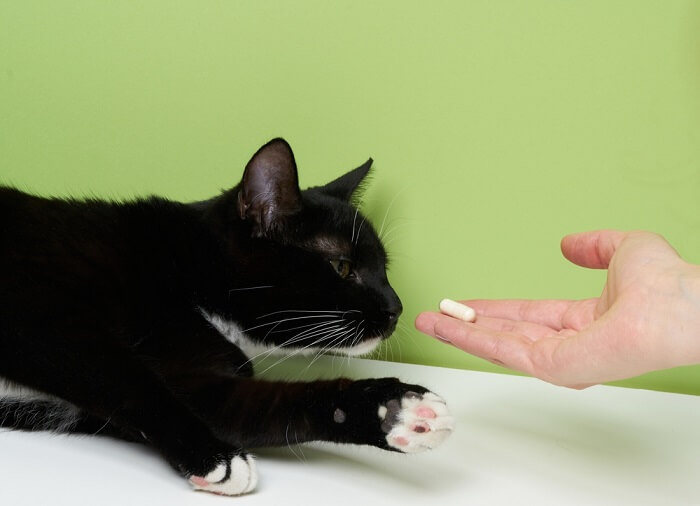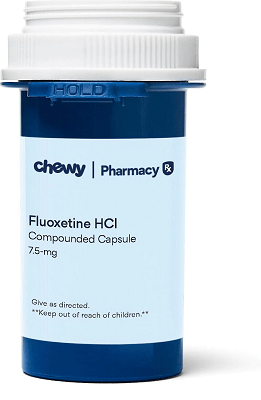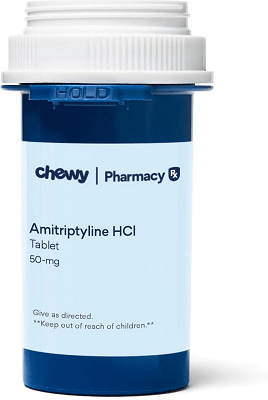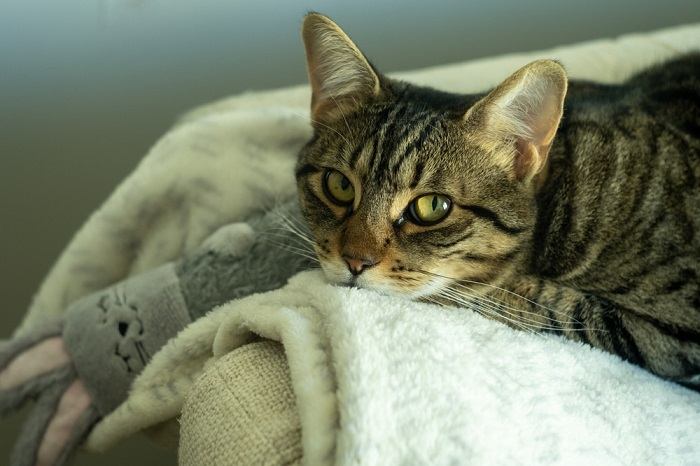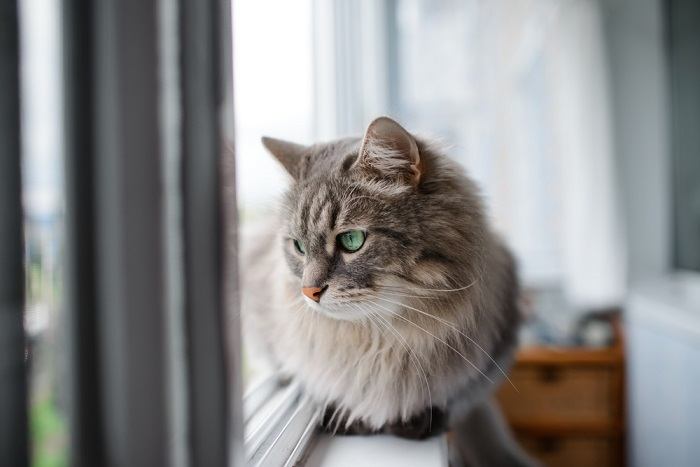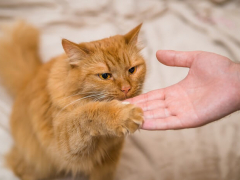Just like in people, cats can suffer from disorders related to fear and anxiety. In this article, we’ll review what to look for in a cat with an anxiety issue, both short and long-term medications used for anxiety in cats, and some other strategies that can be used to help anxious or stressed kitties at home.
While it's not the only solution available, anxiety medication can help cats who are struggling with stress and anxiety. There are numerous types of medication available, including those for short-term and long-term anxiety. Before starting any cat anxiety medication, consult your veterinarian to rule out any medical issues and ensure that your cat receives safe and appropriate medication.Key Takeaways
A Behavioral vs. Medical Problem
Before you start trying medications or supplements for anxiety, it’s important to be sure that there is no underlying health condition behind your cat’s behaviors.
While it is true that roughly ¼ of cats may suffer from a stress, fear, or anxiety disorder in the home, it’s important to take some practical steps to ensure a behavioral problem is to blame first before trying something over the counter or purchasing that 5 stars reviewed anxiety supplement online.
As any cat parent can attest to, cats can do some pretty weird things. And it can be hard to tell sometimes if an odd behavior is really due to behavior alone or whether an underlying medical issue is present.
Pain can be one medical issue that can manifest in cats with odd behaviors, and it’s not always clear that a source of pain is present. Cats may not visibly limp, but may show signs like reduced activity, hiding behavior, irritability, or aggression if they are experiencing chronic pain.
Abnormal urinary behavior is another example. Urinating outside of the litter box is a common manifestation of stress or irritability in cats, but a bacterial infection can look pretty much the same and requires a different medical approach.
Issues with the skin and coat, like excessive grooming, chewing, or licking can be from OCD-type behavior from stress, but could also be related to a hard-to-see wound, a skin allergy condition or skin infection, or fleas. Cats also spend a lot of their time grooming and while this may appear excessive to some concerned cat parents, this may actually be normal behavior.
These examples are just a couple of reasons why it’s important to see your veterinarian if you’re concerned about behavior you’re seeing in your cat. Your vet can help to rule out an underlying medical disorder to help make sure that the right therapy is pursued.
Also Read: 9 Cat Behavior Changes To Worry About
Anxiety Medications
Several types of anti-anxiety medications for cats exist, and the right choice for your cat depends on their needs.
Prescription medications for anxiety can be divided into short-term medications and long-term or chronic-use medications. For more detailed information on specific medications, follow the in-site links provided.
Short-Term Medications
Short-term medications like the ones listed below are most often used for brief, predictable episodes of stress or anxiety. This includes events like veterinary exam visits, car or plane travel, or stressful things at home like parties, thunderstorms, fireworks, or construction. These medications are often given a certain period of time before a known event. In some cases, they may also be used alongside long-term medications as well.
Also Read: 7 Sounds Cats Hate That You Should Avoid
#1 Gabapentin (Neurontin)
Medication Overview
- Medication Type: Anticonvulsant
- Form: Liquid, Topical Cream or Gel
- Prescription Required?: Yes
- FDA Approved?: No
Gabapentin is classified as an anticonvulsant, anxiolytic (relieving anxiety), and neuropathic pain analgesic. It’s a medication commonly used in cats for both stress and anxiety, as well as for chronic pain. For behavior, it is most often used to decrease fear responses during veterinary exam visits and car or plane travel.
It is thought that its ability to inhibit excitatory neurotransmitters like substance P, glutamate, and norepinephrine is what plays its role in reducing anxiety and fear responses. It also can prevent hyperalgesia, or an exaggerated response to a painful stimulus, as well as allodynia, which is when a typically normal stimulus (like touching a kitty’s foot during an exam) causes an inappropriate pain response.
Sedation and ataxia (abnormal walking and imbalance) are common side effects but are often dose-dependent. When used as a chronic pain medication, a vet may start with lower doses to achieve pain relief while minimizing these effects, but when higher doses are used for anxiety relief these side effects will be more common. It is common to give a prescribed dose about 2-3 hours prior to a stressful event. The effects of gabapentin gradually wear off after about 8-12 hours.
Because it is not classified as an antidepressant and does not have effects on serotonin, gabapentin may be used more often together with long-term anxiety medications.
While not a federally controlled substance, gabapentin may be subject to additional monitoring and precautions on the part of veterinary prescribers.
Also Read: What Can You Give A Cat For Pain? 6 Vet-Recommended Options
#2 Trazodone (Desyrel)
Medication Overview
- Medication Type: Serotonin antagonist/reuptake inhibitor sedative/anxiety relief medication
- Form: Oral tablets
- Prescription Required?: Yes
- FDA Approved?: No
Trazodone is classified as a serotonin antagonist/reuptake inhibitor. Serotonin is a chemical messenger in the body that is involved with mood and emotion. Trazodone can be considered a type of antidepressant and sedative.
Trazodone can be used in cats prior to vet appointments as well as prior to travel. Its use has been studied more in dogs, but few studies in cats have shown it to have a favorable effect to reduce stress and anxiety in the short term.
Trazodone’s main side effects are sedation and ataxia. Digestive upset may also be seen. Trazodone may sometimes be used together with gabapentin in situations where either medication is not as effective alone.
While not scheduled as a controlled substance in the US, it is subject to additional monitoring practices and precautions on the part of veterinary prescribers.
Also Read: Top 10 Things Your Vet Wishes You Knew
#3 Alprazolam (Xanax)
Medication Overview
- Medication Type: Sedative/tranquilizer/ anxiety treatment
- Form: Oral tablets/Liquid solution
- Prescription Required?: Yes
- FDA Approved?: No
Alprazolam is in a class of drugs called benzodiazepines, which also includes diazepam (Valium), oxazepam (Serax), clorazepate (Tranxene) and lorazepam (Ativan). All of these drugs are considered controlled substances (DEA Schedule-IV) which requires additional documentation and precautions on the part of veterinary prescribers.
Xanax can be used to help with triggering events like veterinary exams or travel. It may also be used alongside other long-term medications used for anxiety disorders. In cats, it may be helpful if inappropriate elimination (urination or defecation) is seen as a manifestation of anxiety or stress.
Xanax typically causes sedation and can cause ataxia as well. Increased appetite may also be seen with this class of drugs. Alprazolam should be used cautiously in patients that exhibit signs of aggression, as behavioral disinhibition (where a pet is even less able to control these behaviors) can be seen. It should be used cautiously in pets with liver or kidney disease.
Of all the oral benzodiazepine drugs, alprazolam is considered the safest to use. Most of the others listed below carry an increased risk in cats for liver failure after several days of use. This effect is not guaranteed and is considered less common, but because of the severity of the side effect, other benzodiazepines are not commonly used in cats. This effect has not been seen with alprazolam.
Also Read: Drug Poisoning In Cats: Causes, Symptoms, & Treatment
#4 Lorazepam (Ativan)
Medication Overview
- Medication Type: Benzodiazepine/ Anxiety, Fears, and Phobias treatment
- Form: Oral tablets/Liquid solution
- Prescription Required?: Yes
- FDA Approved?: No
Lorazepam is also a benzodiazepine. While alprazolam may be considered first, it can be used in cats alongside long-term medications for fear and anxiety disorders. It does appear to have a better safety profile for pets with liver dysfunction.
The most common side effects include sedation, lethargy, and an increase in appetite. Similar to alprazolam, behavioral disinhibition (where a pet is even less able to control these behaviors) can be seen.
#5 Clorazepate (Tranxene)
Medication Overview
- Medication Type: Benzodiazepine/ Behaviour disorders and seizures treatment/Anxiety and Phobias relief
- Form: Oral tablets/Compounded into a liquid form
- Prescription Required?: Yes
- FDA Approved?: No
Clorazepate is also a benzodiazepine. While it can be used for similar reasons as alprazolam or lorazepam, it has not been studied as well in cats.
#6 Oxazepam (Serax)
Medication Overview
- Medication Type: Benzodiazepine/Stimulate Appetite/Behaviour disorder, anxiety and phobias relief
- Form: Oral tablets/Compounded into a liquid form
- Prescription Required?: Yes
- FDA Approved?: No
Oxazepam is a benzodiazepine as well. Like lorazepam, it may be a reasonable choice in some cases for older kitties and those with liver disease concerns. However, there have been reports of acute liver failure, so its use remains controversial in cats.
Also Read: Liver Cancer In Cats: Causes, Symptoms, & Treatment
#7 Diazepam (Valium)
Medication Overview
- Medication Type: Benzodiazepine anticonvulsant/Tranquilizer/Muscle relaxant, Anti-anxiety medication, Appetite stimulant, Anti-seizure medication
- Form: Oral tablets/Liquid solution/Injection
- Prescription Required?: Yes
- FDA Approved?: No
Valium is possibly the most widely-recognized benzodiazepine but the oral form of diazepam does come with safety concerns in cats in regards to acute liver failure and is not typically used since there are other, safer alternatives available. This concern does not carry over for injectable diazepam, which is commonly used as a sedative for veterinary procedures and to stop acute seizure episodes.
Long-Term Medications
Sometimes used in conjunction with short-term medication, long-term medications are best for cats who struggle with chronic anxiety.
Long-term anxiety medications can be thought of as any such medication that is used daily for at least 4-6 weeks or longer. The medications in this list are usually started and if successful in helping with anxiety behaviors, are continued long-term or until an anxiety trigger is removed.
They should never be discontinued abruptly without advice from a veterinarian. Their goal is to keep kitties in a generally calmer state day to day. Short-term medications may still be needed if a very stressful trigger is anticipated.
Also Read: The 10 Things That Cats Hate Most
#8 Fluoxetine (Prozac)
Medication Overview
- Medication Type: Selective Serotonin Reuptake Inhibitior (SSRI)
- Form: Chewable tablets, oral tablets, oral capsules, oral solution.
- Prescription Required?: Yes
- FDA Approved?: Not for cats (Reconcile is FDA approved for dogs)
Fluoxetine is a selective serotonin reuptake inhibitor (SSRI) and is one of the most commonly used long-term anxiety medications in cats. It is also a first go-to for inappropriate urination in cats, which in many cases can be behavior related to stress or anxiety.
Also Read: Cat Keeps Peeing On Husband’s Things? Top 5 Reasons Why
#9 Paroxetine (Paxil)
Medication Overview
- Medication Type: Selective Serotonin Reuptake Inhibitor (SSRI) Antidepressant/ Aggression, anxiety, and stereotypic/obsessive-compulsive behaviors treatment
- Form: Oral tablets/Liquid suspension
- Prescription Required?: Yes
- FDA Approved?: No
Paroxetine is another SSRI that can be used long-term in cats. In addition to helping with anxiety and urine marking, it may also be indicated for cats who exhibit aggressive behavior and for feline hyperesthesia syndrome.
Also Read: Why Is My Cat Staring At The Wall?
#10 Sertraline (Zoloft)
Medication Overview
- Medication Type: Serotonin Reuptake Inhibitor (SSRI) antidepressant, Behavior disorders, anxiety, obsessive-compulsive disorder, and aggression treatment
- Form: Oral tablets / Liquid solution
- Prescription Required?: Yes
- FDA Approved?: No
Sertraline, another SSRI, can be considered for the same reasons as Prozac and Paxil, including anxiety, aggressive behaviors, inappropriate elimination, and obsessive-compulsive behaviors (like hair barbering).
#11 Amitriptyline (Elavil)
Medication Overview
- Medication Type: Tricyclic antidepressant, antipruritic, neuropathic pain modifier
- Form: Oral tablets
- Prescription Required?: Yes
- FDA Approved?: No
Amitriptyline is a tricyclic antidepressant which can be used in cats long-term for anxiety. It is most often reached for if cats exhibit signs of excessive grooming, ingestion of inappropriate objects (pica), and urine spraying.
It is also thought to have an action against nerve pain and may be used in cats that appear to have hypersensitive reactions when touched or excessively traumatize an area of the skin from apparent irritation when no lesions can be found. While not well documented, it may also be used anecdotally for cats with feline lower urinary tract disease to help ease urination.
#12 Buspirone (BuSpar)
Medication Overview
- Medication Type: Antianxiety medication/Behavior disorders, fears, phobias relief/Urine spraying, psychogenic alopecia, and motion sickness treatment
- Form: Oral tablets
- Prescription Required?: Yes
- FDA Approved?: No
Buspirone is classified as a nonbenzodiazepine anxiolytic agent. However, it may take a week or more to be effective and is not appropriate for situational anxieties like benzodiazepines.
In cats, it may be used more for those experiencing phobias or fear-related behaviors, leading some cats to appear less reactive and more affectionate. It has been found to be fairly successful in reducing urine marking, especially in multi-cat households. It may also be used for psychogenic alopecia, or barbering behavior.
Also Read: Hair Loss In Cats: Causes, Symptoms, & Treatment
Also Read:
#13 Clomipramine (Clomicalm, Anafranil)
Medication Overview
- Medication Type: Tricyclic antidepressant medication/ Obsessive-compulsive disorders/ Separation anxiety or aggression relief
- Form: Oral tablets or capsule
- Prescription Required?: Yes
- FDA Approved?: No
Clomipramine is a tricyclic antidepressant that may be useful in cats, especially when inappropriate urination is involved. It may be used initially or may be considered if a fluoxetine trial for anxiety behaviors was not successful.
Cats are reported to be more susceptible than dogs to clomipramine’s side effects, which can include dry mouth, constipation, sedation, and diarrhea.
Also Read: Best Cat Food For Constipation
Important Considerations For Any Behavioral Medication
Just like starting any other medication, anxiety medications should be approached with caution.
Before starting any medication, make sure to discuss with your veterinarian any other medications or supplements your cat may be taking, as well as any chronic underlying health conditions. Many of these medications are safe to use with a variety of health conditions, but caution should always be considered with any advanced stages of kidney or liver disease.
It can be common to use some of the long-term and short-term medications together. However, it’s very important to follow your vet’s advice on dosing. Serotonin syndrome can be a concern if two drugs are used together that allow levels of serotonin to build up too high in the body.
Common signs of serotonin syndrome include irritability, hyperactivity, vomiting, diarrhea, elevated body temperature, depression, hypersalivation, breathing changes, and disorientation.
Paradoxical excitement and behavioral disinhibition describe unexpected behavioral effects where instead of calming and sedation occurring as expected, excitement, irritation, and aggression may be seen instead. This is uncommonly seen with sedatives, but can be seen with any type of sedative or anxiety relief medication.
Many of these medications alter neurotransmitters in the brain. If one of these medications is looking to be discontinued but has been used for a long time (at least a few weeks), your vet may commonly advise slowly tapering the dose down.
Lastly, never give your cat a medication prescribed for yourself. There are some that are not considered safe for cats, and even those medications that can be used in cats will typically have dosing much different than those used for people.
If you are ever concerned about the side effects of a behavioral medication, if you are worried about an overdose, or if your cat may have ingested a human medication in your home, it is best to give the ASPCA Animal Poison Control Center (1-888-426-4435), or Pet Poison Helpline (1-855-764-7661) a call immediately for further advice.
Also Read: Drug Poisoning In Cats: Causes, Symptoms, & Treatment
Other Anxiety Relief Approaches
Before giving your cat anxiety medications, it helps to explore other options, including environmental enrichment and other supplements.
Before prescribing an actual medication, your vet may discuss supplements such as Zylkene, L-theanine products like Anxitane and Solliquin, or calming pheromone diffusers like Feliway. These products do not always provide a full solution for all cats, but may help to curb anxiety and reduce the need for medication.
Anxiety disorders treated with medication should also be addressed with attempts at behavior modification approaches. This is easier for dogs than cats but can include providing a cat with quiet safe spaces away from people and other pets, providing stimulating “hunting” activities with products like Doc and Phoebe’s Indoor Cat Hunter Kit, ensuring 15 minutes of play in divided sessions per day, and providing places to observe the outdoors like window perches.
Sometimes, these strategies can be tried before considering medication, but it’s always best to discuss any behavioral concerns with your vet, who can provide a more complete list of behavioral approaches for your kitty as well as medication recommendations if needed.
Drug Dosing Disclaimer: We are only able to provide doses for medications that are FDA approved for use in cats and only as the label guidelines dictate. For medications that are used off-label we can only provide guidelines and safety information for use. Safe and appropriate dosing for off-label medications can only be determined by a primary care veterinarian.
We encourage you to work with your veterinarian to determine if a particular medication is appropriate for your cat. Changing or adjusting a dose for your cat on your own without consulting with a veterinarian can carry risk. We do not encourage use of medications prescribed for human use in pets without first consulting with a primary care veterinarian.
Frequently Asked Questions
What Medication Can I Give My Cat for Anxiety?
You should consult with your veterinarian on any prescription medications that may help your cat with anxiety. It is very important to never give your cat any human anxiety medications that may have been prescribed for yourself or a family member. There are some medications that are not safe for cats and many dosages prescribed for people are inappropriate for use in cats.
What Can I Give My Cat Daily for Anxiety?
This may depend on the type and severity of your cat’s anxiety. Feliway products can be used daily in the home to help reduce signs of stress and some over the counter products like L-theanine supplements can be helpful too. However, if your cat is showing more severe signs of stress or anxiety or if it’s hard to tell if your cat is experiencing a medical vs. behavioral problem, your veterinarian can help guide you and recommend medication options that can help.
What Do Vets Recommend to Calm Cats?
This will largely depend on how a cat is displaying signs of anxiety and how severe they are. Milder signs of stress or anxiety may be managed by identifying and removing triggers, modifying the home environment, and using over the counter anxiety relief products. More severe signs of stress or anxiety may require prescription medication.
Can I Give My Cat Benadryl for Anxiety?
Benadryl (diphenhydramine) is an over the counter antihistamine which can cause signs of sedation in some pets. It does not reduce anxiety specifically, but may help make a cat more sleepy and less reactive.
-
Plumb DC. Plumb’s Veterinary Drugs. Multiple entries referenced. Updated 2022. Accessed January 2023.
